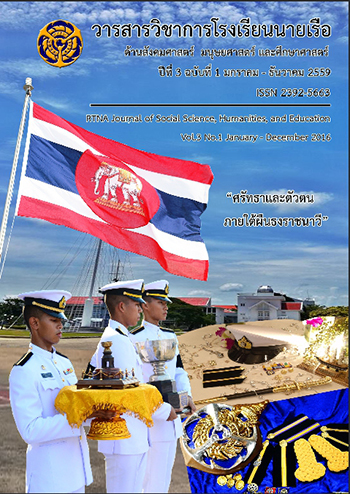การติดตามและประเมินผลนายทหารผู้สำเร็จการศึกษาจากโรงเรียนนายเรือ ปีการศึกษา 2555
คำสำคัญ:
การติดตามและประเมินผล, นายทหารผู้สำเร็จการศึกษาจากโรงเรียนนายเรือบทคัดย่อ
การวิจัยครั้งนี้มีวัตถุประสงค์เพื่อ 1) ประเมินความพึงพอใจในคุณภาพนายทหารผู้สำเร็จการศึกษาจากโรงเรียนนายเรือ 2) ศึกษาการนำความรู้ที่ได้จากหลักสูตรการศึกษาโรงเรียนนายเรือ และหลักสูตรประกาศนียบัตรบัณฑิต สาขาวิทยาการทหารเรือไปใช้ในการปฏิบัติงาน 3) ประเมินความพึงพอใจตนเองในการปฏิบัติงานของนายทหารผู้สำเร็จการศึกษาจากโรงเรียนนายเรือ และ 4) ศึกษาแนวทางในการปรับปรุงและพัฒนาการฝึกศึกษาของโรงเรียนนายเรือให้มีความเหมาะสมมากยิ่งขึ้น รูปแบบการวิจัยใช้ระเบียบวิธีวิจัยเชิงบรรยาย (Descriptive Research) ประชากรที่ใช้สำหรับการวิจัย คือ นายทหารผู้สำเร็จการศึกษาฯ ในปีการศึกษา 2555 จำนวน 43 นาย และผู้บังคับบัญชาของนายทหารผู้สำเร็จการศึกษาทุกนาย สามารถเก็บรวบรวมข้อมูลกับผู้บังคับบัญชา และผู้สำเร็จการศึกษาได้ร้อยละ 81.40 และ 79.07 ตามลำดับ เครื่องมือที่ใช้ในการวิจัยจำนวน 2 ฉบับ ได้แก่ แบบสอบถามการติดตามและประเมินผลนายทหารผู้สำเร็จการศึกษาจากโรงเรียนนายเรือ ปีการศึกษา 2555 สำหรับผู้บังคับบัญชา และสำหรับตัวนายทหารผู้สำเร็จการศึกษา ซึ่งเป็นแบบสอบถามชนิดออนไลน์ สถิติที่ใช้ในการวิเคราะห์ข้อมูล ได้แก่ ค่าความถี่ ค่าร้อยละ ค่าเฉลี่ยเลขคณิต ค่าส่วนเบี่ยงเบนมาตรฐาน และการวิเคราะห์เนื้อหา สรุปผลการวิจัย 1. นายทหารผู้สำเร็จการศึกษาได้รับการประเมินคุณภาพอยู่ในระดับดีขึ้นไปทุกนาย และผู้บังคับบัญชามีความพึงพอใจในคุณภาพนายทหารผู้สำเร็จการศึกษาในภาพรวมอยู่ในระดับมาก ส่วนผู้สำเร็จ การศึกษามีความพึงพอใจในคุณภาพของตนเองในภาพรวมอยู่ในระดับมากเช่นเดียวกัน 2. นายทหารผู้สำเร็จการศึกษาแสดงความคิดเห็นว่าได้นำความรู้จากการฝึกศึกษา ตามหลักสูตรการศึกษาโรงเรียนนายเรือ พ.ศ.2545 และหลักสูตรประกาศนียบัตรบัณฑิต สาขาวิทยาการทหารเรือไปใช้ในการปฏิบัติงานในภาพรวมอยู่ในระดับมาก 3. นายทหารผู้สำเร็จการศึกษามีความพึงพอใจในการปฏิบัติงานของตนเองในภาพรวมอยู่ในระดับมาก โดยพบว่า เรื่องที่มีความพึงพอใจในระดับมากที่สุด จำนวน 2 เรื่อง ได้แก่ ผู้บังคับบัญชา/ หัวหน้างานและตำแหน่งหน้าที่การงานในปัจจุบัน นอกนั้นมีความพึงพอใจในระดับมาก 4. ผู้บังคับบัญชาเสนอแนวทางในการปรับปรุงและพัฒนาการฝึกศึกษาของโรงเรียนนายเรือ คือ 1) พัฒนาสมรรถนะด้านความเป็นครูทหาร ทักษะการนำเสนอ และการบรรยายสรุป และ การประยุกต์ใช้เทคโนโลยีสมัยใหม่ในการปฏิบัติงานในอนาคต 2) พัฒนาทักษะภาษาอังกฤษของนักเรียนนายเรือโดยเฉพาะทักษะการพูด 3) เน้นการฝึกและพัฒนาสมรรถนะด้านทักษะวิชาชีพทหารเรือ 4) พัฒนาสมรรถนะด้านการคิดวิเคราะห์อย่างเป็นระบบ และ 5) พัฒนาบุคลิกลักษณะภาวะผู้นำทางทหาร ความรับผิดชอบ ความอดทนในการปฏิบัติหน้าที่ ตลอดจนความรักและความภาคภูมิใจในการเป็นทหารเรือ ส่วนผู้สำเร็จการศึกษาได้เสนอแนวทางในการปรับปรุงและพัฒนาการฝึกศึกษาของโรงเรียนนายเรือ คือ การพัฒนานักเรียนนายเรือในเรื่องการเขียนหนังสือราชการ และระบบงานสารบรรณ
เอกสารอ้างอิง
ประอร สุนทรวิภาต. (2545). การติดตามและประเมินผลผู้สำเร็จการศึกษา คือ หัวใจสำคัญของการประกันคุณภาพการศึกษาโรงเรียนนายเรือ. วารสารโรงเรียนนายเรือ. 2, 30-35.
โรงเรียนนายเรือ. (2558). หลักสูตรการศึกษาโรงเรียนนายเรือ พ.ศ.2558.สมุทรปราการ: โรงเรียนนายเรือ. (อัดสำเนา).
โรงเรียนนายเรือ. กองสถิติและวิจัย. (2558). การติดตามและประเมินผลนายทหารผู้สำเร็จการศึกษาตามหลักสูตรการศึกษา โรงเรียนนายเรือพ.ศ.2545 และหลักสูตรประกาศนียบัตรบัณฑิต สาขาวิทยาการทหารเรือ รุ่นที่ 7.สมุทรปราการ: โรงเรียนนายเรือ. (อัดสำเนา).
วิเชียร เกตุสิงห์. (2543). สถิติวิเคราะห์สำหรับการวิจัย. พิมพ์ครั้งที่ 4. กรุงเทพมหานคร: เจริญผล.
สถาบันวิชาการป้องกันประเทศ กองบัญชาการกองทัพไทย.(2558). ตัวบ่งชี้การตรวจสอบและประเมินคุณภาพการศึกษาภายใน สถาบันการศึกษาของกองทัพระดับปริญญาตรีขึ้นไป รอบสี่ (พ.ศ.2559 - 2563).กรุงเทพมหานคร. (อัดสำเนา).
สำนักงานคณะกรรมการการอุดมศึกษา. (2552). แผนพัฒนาการศึกษาระดับ อุดมศึกษาฉบับที่ 10 พ.ศ.2551- 2554. (ออนไลน์). แหล่งที่มา: www.mua.go.th/users/tqf-hed/news/News328072552.pdf. 25 กันยายน 2554
ดาวน์โหลด
เผยแพร่แล้ว
ฉบับ
ประเภทบทความ
สัญญาอนุญาต
เนื้อหาและข้อมูลในบทความที่ลงตีพิมพ์ในวารสารวิชาการโรงเรียนนายเรือ ด้านสังคมศาสตร์ มนุษยศาสตร์ และ ศึกษาศาสตร์ ถือเป็นข้อคิดเห็นและความรับผิดชอบของผู้เขียนบทความโดยตรง ซึ่งกองบรรณาธิการวารสาร ไม่จำเป็นต้องเห็นด้วย หรือร่วมรับผิดชอบใด ๆ
บทความ ข้อมูล เนื้อหา รูปภาพ ฯลฯ ที่ได้รับการตีพิมพ์ในวารสารวิชาการโรงเรียนนายเรือ ด้านสังคมศาสตร์ มนุษยศาสตร์ และ ศึกษาศาสตร์ ถือเป็นลิขสิทธิ์ของโรงเรียนนายเรือ หากบุคคลหรือหน่วยงานใดต้องการนำทั้งหมดหรือส่วนหนึ่งส่วนใดไปเผยแพร่ต่อหรือเพื่อกระทำการใด ๆ จะต้องได้รับอนุญาตเป็นลายลักษณ์อักษร จากโรงเรียนนายเรือก่อนเท่านั้น






